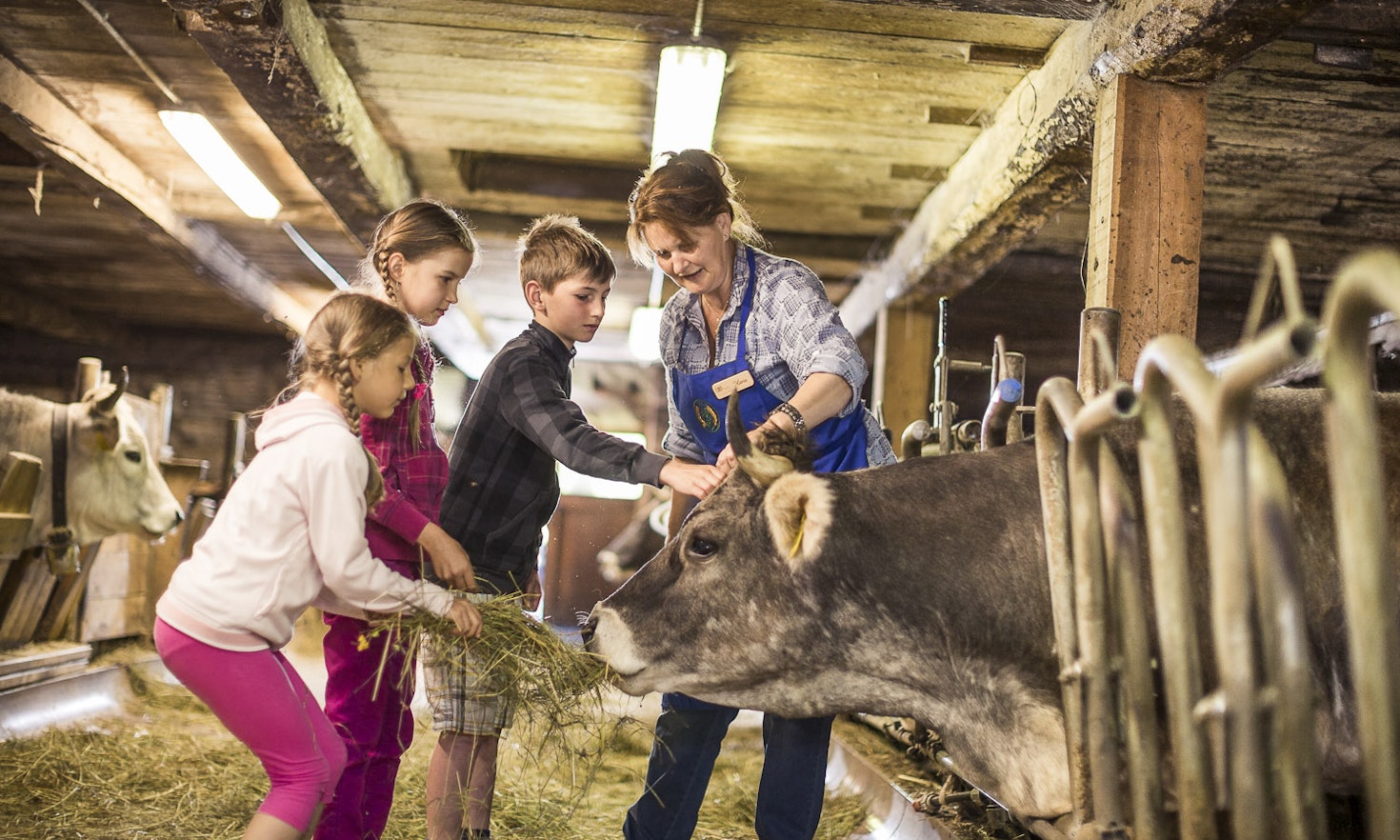Social farming in South Tyrol: an example of social innovation in rural areas

European rural and peripheral areas have to cope with demographic, economic and social problems like urbanization, depopulation, aging and job-loss. Providing social and health care services has become a common challenge in peripheral and rural areas, due to centralization processes of civil services. Thus, social farming activities have been established as practical answer to respond to the needs of society that many institutionalised social services are no longer able to provide adequately.
Christian Hoffmann, Miriam Laura Weiß and Clare Giuliani from the Institute of Regional Development, together with the ROI consultant team were called to participate in a study on social farming. The study was commissioned by the South Tyrolean women farmer’s association and financed by the provincial innovation department. The aim of the study was twofold. On the one hand, the Eurac researchers were appointed to provide an overview of the existing social farming practices in selected European countries (Netherlands, Germany, Austria, Switzerland, Italy and South Tyrol) based on the following criteria: qualification requirements, financing of the services, cooperation, certification and legal framework to illustrate the variety of social farming in Europe. Thereby, best practice examples were identified through literature review and qualitative interviews and listed in a dataset. On the other hand, the ROI consultant conducted an online survey addressed to the members of the South Tyrolean women farmers association, to find out the potentials of social farming for South Tyrol.
According to Di Iacovo and O’Connor (2009) social farming describes short or long-term activities that use agricultural resources such as animals and plants to promote and generate social services in rural areas. Examples of these services include rehabilitation, therapy, sheltered employment, educational and care activities that contribute to social inclusion.
In the mid-20th century, social farming activities emerged in the western European countries (e.g. Belgium and the Netherlands) and soon spread throughout Europe (Gallis, 2013). Today, social farming activities are considered a reliable system of social care. The two main fields of social farming among the variety of initiatives are employment-oriented initiatives and educational farms. The employment-oriented initiatives aim at labour and social inclusion on the farm and address different people such as long-term unemployed, people with special needs, elderly, migrants etc. Childcare and educational initiatives include care and the education of children with the aim of providing environmental education by directly involving them in farm activities.
First experiences in social farming in South Tyrol started in 2007. The South Tyrolean social cooperative “Mit Bäuerinnen lernen-wachsen-leben” (Learning- growing- living with women farmers) offers day care for children, educational activities, elderly care and life counselling for farmers’ families. Firstly, the social cooperative initiated day care for children on farms with the objective of providing childcare and encouraging interaction with nature. Thus, the farm has been expanded to a place of learning and offers a complementary and alternative setting for environmental education. Away from classical environmental education towards a direct integration of agricultural resources as teaching elements. Consequently, the farm aims at stimulating the curiosity of children in learning, as well as developing their awareness for environmental, sustainable and rural resources. The childcare service includes individually adapted care accommodating up to six children, flexible care hours, integration into the family structure, transmission of traditional and cultural values, environmental education, summer care as well as care for children at different events. Secondly, some of the social cooperative members offer educational farm activities for schoolchildren, where they spend a few hours on the farm and practically get to know the cultural environment of farm life. Thirdly, the social cooperative offers life counselling and conflict mediation since 2009. Fourthly, due to a pilot project, elderly care on farms has been introduced in 2014. With this service, the providers directly react to the steadily growing number of old people in South Tyrol; while in 1975 the province counted 43.500 people above 64 in 2015, the number increased to 100.000 (ASTAT Info No. 64 09/2016). Besides responding to an aging society, the service addresses the growing concern about the efficiency of the institutionalised public services and their availability. Thus, elderly care on farms allows elderly people to receive family orientated care and be actively integrated in farming life. The professional schools for agriculture and domestic management in South Tyrol offer the qualification course “elderly people on farms” as well as the course for “day care mothers”, which are a prerequisite for offering the service. Since 2016 a working group consisting of political, scientific, educational and agricultural stakeholders is providing input for the provincial law on social agriculture, which is based on the national law no. 141 implemented in 2015. This law provides principles and procedures for recognising social farming practices in Italy.
The results of the survey are presented in an informative booklet “Social Farming in South Tyrol”, which was presented by the project partners at the press conference on 27 May 2017. The project team suggest that potential activities for South Tyrol, besides child and elderly care, include animal assisted therapy as well as social and labour initiatives. Through this research, a number of positive impacts of social farming have been established. Firstly, adopting new practices can stimulate cooperation between farms, private and public institutions. Secondly, social farming can strengthen rural- urban relations due to different cooperation forms. Thirdly, social farming fosters the clients’ independence, their personal development and enhances their health. Fourthly, it promotes empowerment, especially for women farmers, who besides their traditional farming activities can offer social and health services on the farm. Through the diversification of agriculture, an additional source of income is made available for agricultural households. Overall, social farming pushes innovative patterns of sustainable, rural development that are rooted in local resources. Hence, social farming represents a social innovation, as new initiatives are developed to enhance the capacity and social integration of individuals and establish new collaboration between different social farming stakeholders.
Authors: Clare Giuliani & Elisa Ravazzoli
References
Di Iacovo, F., O’Connor., D., (eds.), 2009: Supporting Policies for Social Farming in Europe. Progressing Multifunctionality in Responsive Rural Areas. ARSIA, Firenze.
Gallis, C., 2013: “What is Green Care? Introduction, History, and Origins” in: Gallis, C. (ed), “Green Care for Human Therapy, Social Innovation, Rural Economy, and Education. Public Health in the 21st century”, Nova Science Publishers, New York.
O`Connor, D., Lai, M., & Watson, S., 2010. Overview of Social Farming and Rural Development Policy in Selected EU Member States. NRN Joint Thematic Initiative on Social Farming.
Links
Citation
This content is licensed under a Creative Commons Attribution 4.0 International license except for third-party materials or where otherwise noted.






